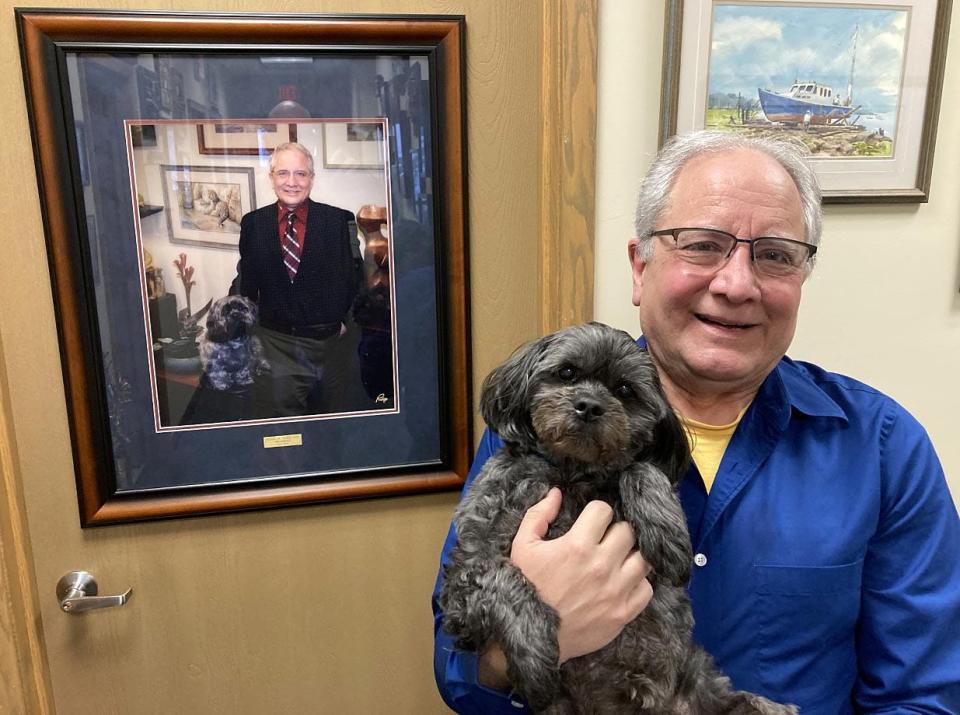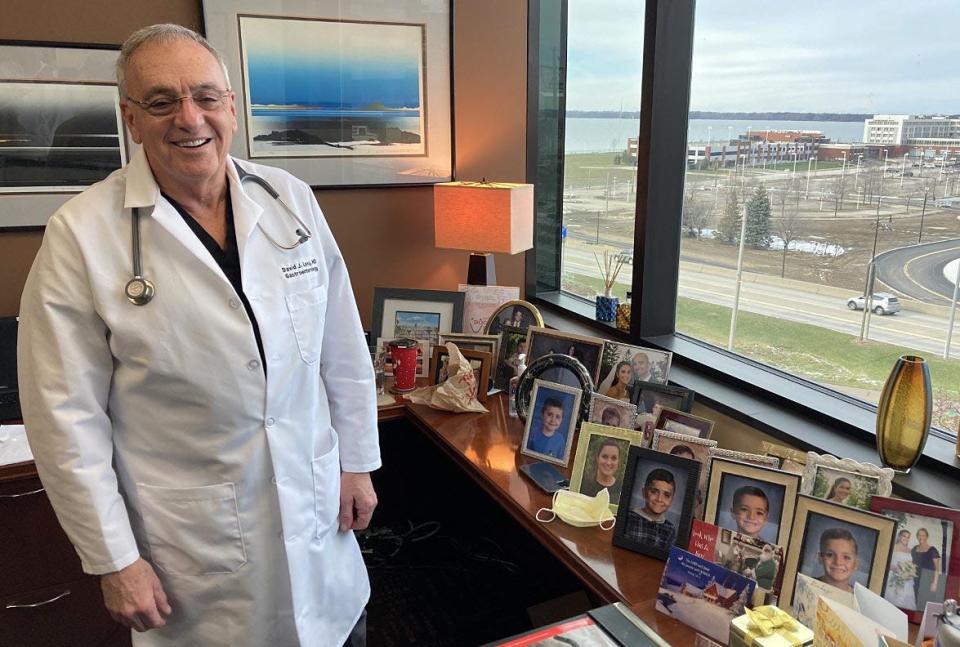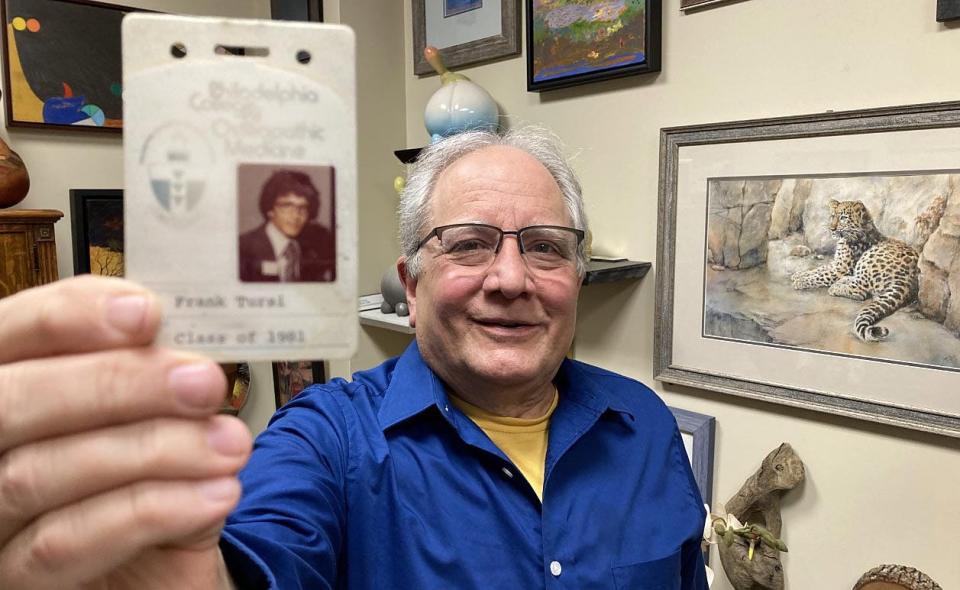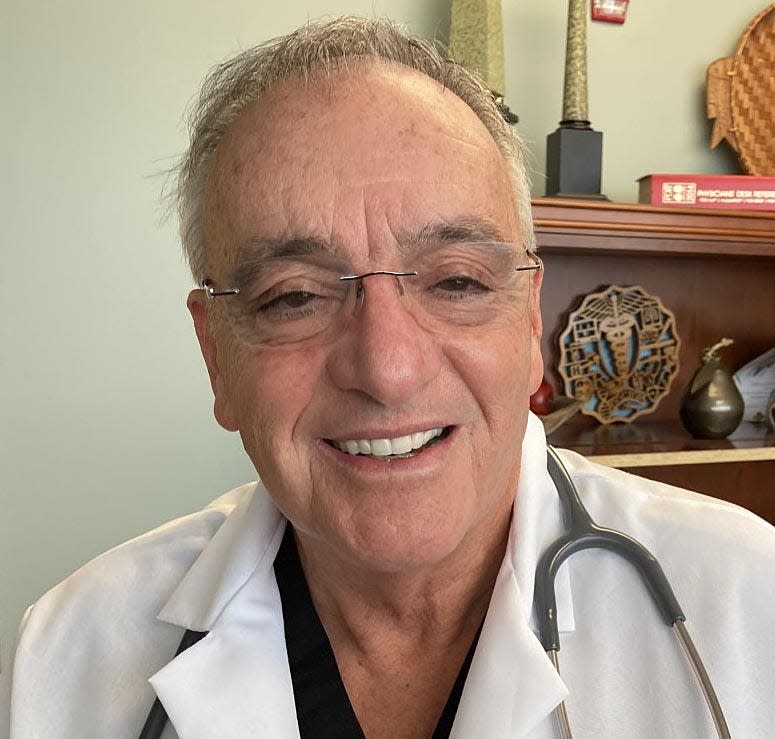Four decades and counting: Two Erie doctors have seen it all and have no plans to retire
Dr. Frank Tursi has been seeing Erie patients for 40 years, long enough to diagnose strep throat in children whose great-grandparents he treated in the early 1980s.
Since the LECOM Health family physician doesn't plan to retire soon, Tursi said he expects to expand on those family connections.
More: Erie surgeon, school principal start second careers by building hospice house
"I see several fourth-generation members of families and one of those families tends to have babies at a young age, so there's a chance I could see a fifth-generation patient," Tursi said with a smile. "It wouldn't surprise me."
Tursi, 67, is one of many Erie-area physicians who have seen patients for decades and continue to work well into their 60s and beyond.

These doctors have witnessed monumental change in both the clinical and business sides of medicine, including mind-boggling improvements in technology, the creation of managed health care and the rise of hospital-owned medical offices.
"Just look at the number of procedures we do now compared to when I started here," said UPMC Hamot gastroenterologist Dr. David Levy. "When I came to Hamot in 1984, I was the only GI doctor but we weren't as busy. I probably did six, seven procedures a day. Now there are six of us in the practice and we do 16 to 20 a day, each."
One reason why Levy, 72, and his fellow GI doctors can do more procedures, such as colonoscopies, is because of technological advancements over the past 30 years.

Not only have these advancements allowed Levy to perform these procedures more quickly, patients often recover faster, and cancers and other abnormalities are sometimes caught at an earlier stage.
"When I started, all our scopes were fiber-optic and we had to look through the scope to see what we were doing," Levy said. "In the '90s and early 2000s, video endoscopy became available and you could watch what you were doing on a screen. Not only could you see better, your assistant could watch at the same time."
More: 60 years ago, this doctor made medical history with Erie's first open-heart surgery
Tursi agreed that medical advancements have benefitted family physicians, too, but he reflected more on the other changes in health care over the past four decades.
When he started in Erie, some family physicians were still delivering babies — like he did for two years at Millcreek Community Hospital — and only a few of them were employed by local health systems, including LECOM Health, UPMC and Allegheny Health Network.
"I had a practice manager but I was still much more involved in the business of running an office," said Tursi, whose Millcreek Township office is decorated with hundreds of paintings and sculptures from local artists. "If someone (an employee) wasn't working out and had to go, I was the one to do it."

Tursi also has witnessed how health insurance changes have affected both physicians and patients. When he started, traditional health insurance covered hospital stays but not much else.
Many patients still had to pay out of pocket for office visits and prescription drugs.
"We tried to discount a little bit, but we weren't allowed to charge one price for cash and another for Medicare," Tursi said. "But if a parent had three kids with runny noses, the cost would be brutal to see all three. So we would do a three-for-one kind of deal."
The evolution of health insurance in the 1990s and 2000s changed all of that, as office visits and prescription drugs were now at least partially covered.
But it also encouraged patients to flood into medical offices to take full advantage of "free care," Tursi said.
"Just because you're covered for a CT scan or MRI doesn't mean you need it for every bump and bruise," Tursi said. "There was a learning curve, for me and for my patients."
Both doctors now work for area health systems
Both Tursi and Levy started their Erie careers in private practice, and like so many local physicians, eventually accepted jobs or sold their practices to area health systems.
Tursi is a LECOM Health employee, while Levy works for UPMC.

"We realized that if we were to compete in the workplace, we needed the advantages of (buying in) scale that we got from joining with UPMC," Levy said. "Because our practice was strong, we got a good deal. And being part of a large health system means they have our backs."
Tursi, who at one point was seeing patients at three Erie County offices, joined LECOM's Medical Associates of Erie in 2009.
Becoming an employed physician was a "double-edged sword," Tursi said.
"I no longer had to worry about staffing or equipment breaking down," Tursi said. "It was an adjustment. The employees technically didn't work for me any longer. But the practice itself didn't change at all."
More: A northwest Pa. man donated a kidney to a stranger. How that act changed two lives.
COVID-19 affected both practices
Tursi's and Levy's practices did change in 2020 due to the COVID-19 pandemic.
More: 20 months later: Erie-area doctor returns to work after COVID-19, double-lung transplant
The UPMC Hamot Surgery Center, of which Levy is a founding owner, closed temporarily and nonessential procedures and surgeries were postponed for months.
"Even after that, patients were afraid to come back," Levy said. "It was tough. It's better now, but we still aren't quite back to where we were."
Tursi's practice never closed due to the pandemic, but anyone who might have COVID was directed to the hospital for testing instead of his office.
As the pandemic continued, his practice — like many others — used telemedicine to see patients remotely via video screens. Tursi still sees some patients that way, but it's not his preference.
"How do you look down someone's throat? It all depends on the lighting they have and how good your screens are," Tursi said. "How can you press on someone's belly during a virtual visit to see if they have a kidney problem?
"Do I like computers? No. If I had my choice we'd go back to paper charts."
But don't mistake Tursi's good-natured grumbling for a desire to stop seeing patients. It's why he continues to work five days a week.
"They come to you when they are sick and you help them get better," Tursi said. "It's a reason to get up in the morning, and come here and see my art."
More: Erie County reports steady childhood immunization rates despite nationwide decline
Contact David Bruce at dbruce@timesnews.com. Follow him on Twitter @ETNBruce.
This article originally appeared on Erie Times-News: Erie PA doctors Frank Tursi, David Levy still on the job after 40 years
